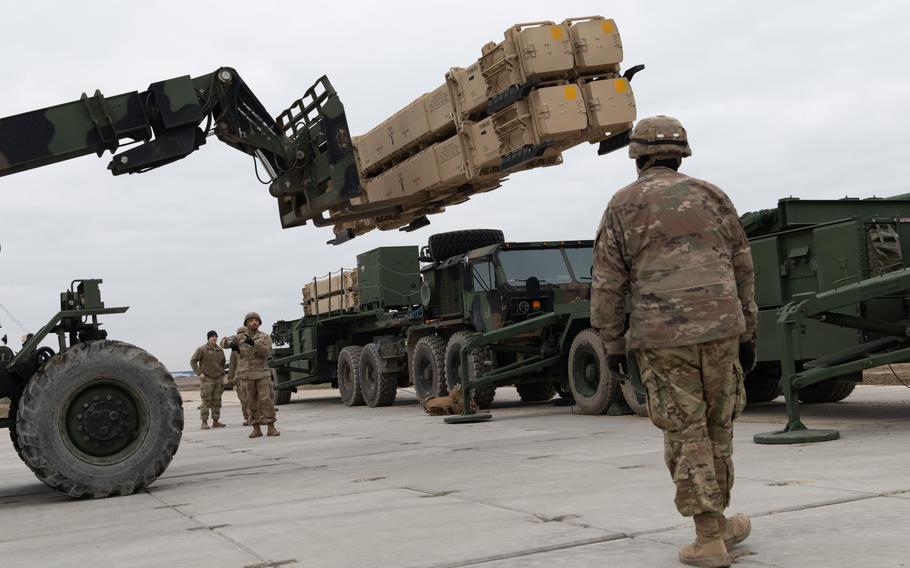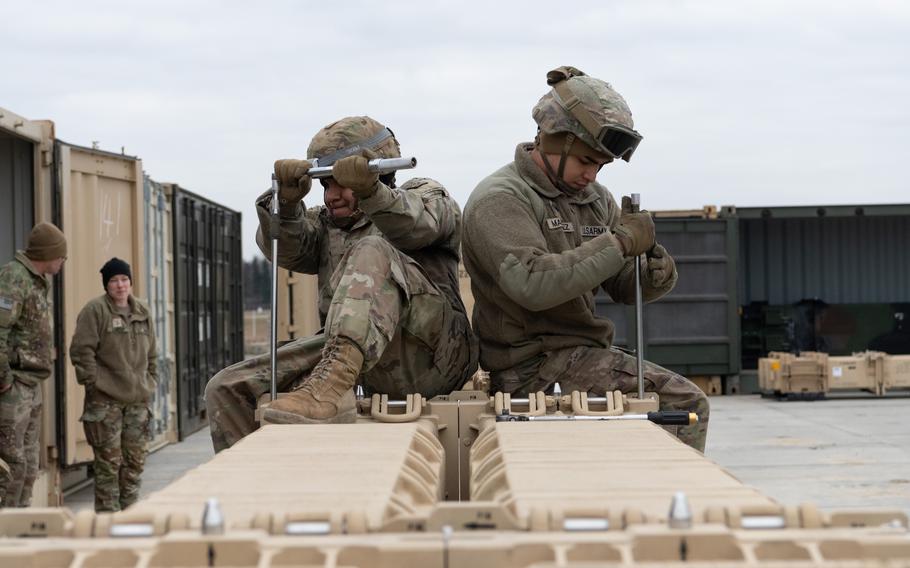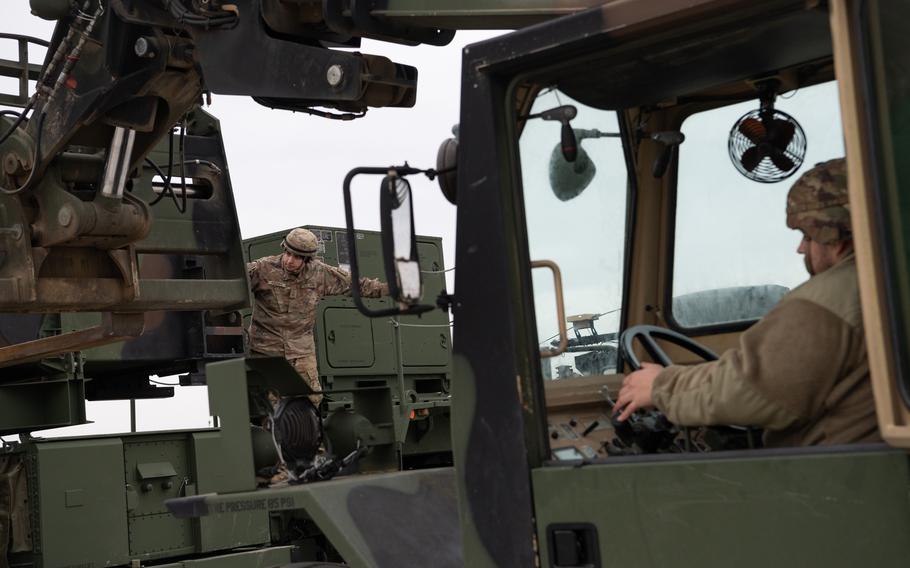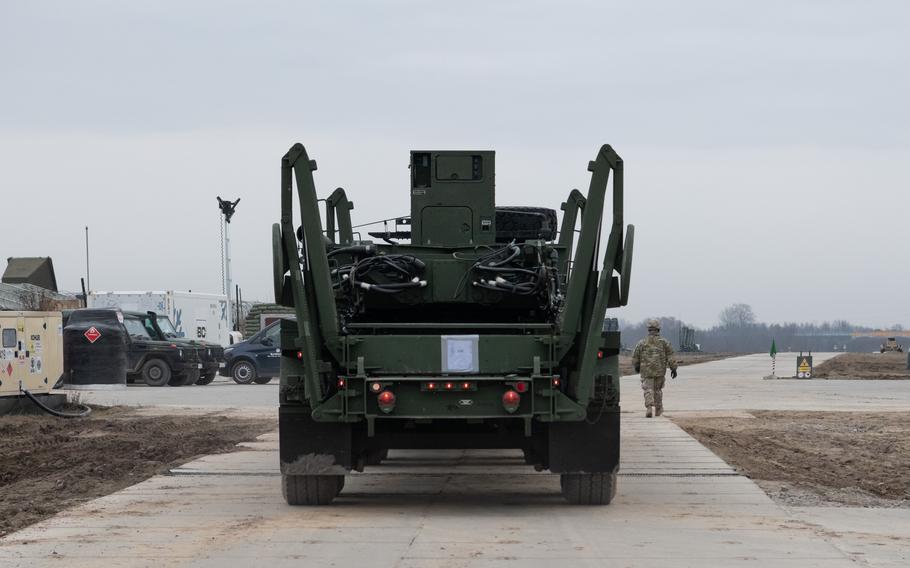
Soldiers with Charlie Battery, 5th Battalion, 7th Air Defense Artillery Regiment remove missiles from their Patriot launcher vehicles near Rzeszow-Jasionka Airport in southeast Poland on Feb. 2, 2025, a day before they officially handed over their mission to German forces. The missiles will be sent to the Army’s ammunition depot in Miesau, Germany. (Phillip Walter Wellman/Stars and Stripes)
JASIONKA, Poland — The U.S. military formally transferred its Patriot missile defense mission in Poland to German forces Monday, marking the first such handover to happen in Europe, officials said.
The Army’s 5th Battalion, 7th Air Defense Artillery Regiment, the only U.S. Patriot missile battalion based in Europe, deployed to Rzeszow-Jasionka Airport in southeastern Poland shortly after Russia’s full-scale invasion of Ukraine in early 2022.
The mission has been the battalion’s priority over the past three years, with two of its four batteries manning two sites at the airport at most times, while the remaining two batteries prepare to deploy at the battalion’s headquarters in Baumholder, Germany.
News of NATO’s takeover of air defenses came days before the Jan. 20 inauguration of President Donald Trump, who has praised Poland’s defense spending but been critical of other allies who have contributed lesser shares of their budget to the alliance.
On Monday, battalion commander Lt. Col. Daniel Corbett played down speculation that the decision to remove his unit from the mission was driven by European leaders’ fears over future U.S. commitment.
“The biggest catalyst for this is that we were redirected to a modernization effort by the chief of staff of the Army,” Corbett said after the transfer of authority to Germany’s Surface to Air Missile Group 21.
Corbett was referring to plans for the unit to become the first operational U.S. Patriot battalion to field the Army’s new Integrated Air and Missile Defense Battle Command System.
The battalion is scheduled to get the system in the coming months, and there had been concerns over how it would do so while simultaneously carrying out the mission in Poland.
Monday’s ceremony marked the first time that a U.S.-led Patriot mission in Europe was turned into a NATO mission, Corbett said.
German troops arrived at the Patriot sites two weeks ago. Soldiers with Charlie Battery, one of the battalion’s last two batteries at the airport, said that the process was easier than expected and that the Germans started operating their Patriot systems a little over a week ago, days ahead of schedule.

Pfc. Norman Romero, left, and Spc. Ezequiel Martinez prepare Patriot missiles to be shipped near Rzeszow-Jasionka Airport on Feb. 2, 2025. The 5th Battalion, 7th Air Defense Artillery Regiment transferred control of their Patriot mission to German forces on Feb. 3. (Phillip Walter Wellman/Stars and Stripes)
The soldiers described an abrupt end to their mission, saying that they had found out about the takeover sometime in November, and that the battalion’s units in Baumholder were already preparing to deploy.
“Leadership came out to the site, rounded up everyone and were like ‘the Germans are coming,’ ” Charlie Battery’s Sgt. Marcus DeLord said. “And we were like, ‘yes, please.’ ”
DeLord said the mission was rewarding but grueling for the unit. The high tempo was especially hard on soldiers with family back at Baumholder.
Charlie Battery commander Capt. Marco Aveledo said the Poland mission took precedence over everything else. The unit hasn’t been able to take part in any training events in Europe, for example.
However, Aveledo said the experience the air defenders got in Poland was unmatched.
“We’ve had the opportunity to work with NATO, not in a superficial way but by actually integrating with them,” Aveledo said.

Pfc. Emilio Azuara, left, a Patriot launcher crew member assigned to 5th Battalion, 7th Air Defense Artillery Regiment, helps remove missiles from a vehicle near Rzeszow-Jasionka Airport in southeast Poland on Feb. 2, 2025, a day before the unit transferred its mission to German forces. (Phillip Walter Wellman/Stars and Stripes)
Aveledo’s battery removed the final missiles from their launchers Sunday and prepared them to be sent back to Germany overland. The soldiers are expected to drive back to Baumholder on Friday.
Several of the battery’s soldiers said they had postponed their redeployments to the U.S. to support the Poland mission because they thought it was important.
“It’s good to come out here and be part of something and feel like you’re doing something to protect others and contribute to something that is bigger than yourself,” said fueler Sgt. Kwadasia Grant, one of the soldiers who pushed back her deployment.
The Patriot is a long-range surface-to-air missile defense system used to shoot down threats such as enemy aircraft, cruise missiles and ballistic missiles.
The system operates with its own dedicated radar and command-and-control setup, meaning each unit functions independently with limited coordination.
In contrast, the IBCS links multiple sensors and missile platforms across the battlefield, providing a unified air defense network. Army officials say the upgrade will allow the unit to integrate with other air defense assets, such as THAAD and Aegis, improving threat detection, tracking and engagement flexibility.
Charlie Battery’s 1st Lt. Mackenzie Arns said most of the unit felt proud of the work. And stepping away from the eastern flank didn’t feel like stepping away from the bigger picture, according to Arns.
“Our mission isn’t done; we are still the only U.S. Patriot asset in Europe,” Arns said. “We’re just going back to focus on something else until they need us again.”

A 5th Battalion, 7th Air Defense Artillery Regiment Patriot launcher vehicle with its missiles removed drives to a loading area near Rzeszow–Jasionka Airport in Poland on Feb. 2, 2025, where it will stay before being transported to Germany later in the week. (Phillip Walter Wellman/Stars and Stripes)